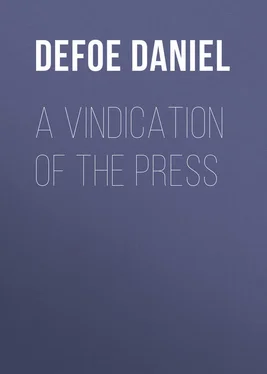Daniel Defoe - A Vindication of the Press
Здесь есть возможность читать онлайн «Daniel Defoe - A Vindication of the Press» — ознакомительный отрывок электронной книги совершенно бесплатно, а после прочтения отрывка купить полную версию. В некоторых случаях можно слушать аудио, скачать через торрент в формате fb2 и присутствует краткое содержание. Жанр: foreign_antique, foreign_prose, на английском языке. Описание произведения, (предисловие) а так же отзывы посетителей доступны на портале библиотеки ЛибКат.
- Название:A Vindication of the Press
- Автор:
- Жанр:
- Год:неизвестен
- ISBN:нет данных
- Рейтинг книги:5 / 5. Голосов: 1
-
Избранное:Добавить в избранное
- Отзывы:
-
Ваша оценка:
- 100
- 1
- 2
- 3
- 4
- 5
A Vindication of the Press: краткое содержание, описание и аннотация
Предлагаем к чтению аннотацию, описание, краткое содержание или предисловие (зависит от того, что написал сам автор книги «A Vindication of the Press»). Если вы не нашли необходимую информацию о книге — напишите в комментариях, мы постараемся отыскать её.
A Vindication of the Press — читать онлайн ознакомительный отрывок
Ниже представлен текст книги, разбитый по страницам. Система сохранения места последней прочитанной страницы, позволяет с удобством читать онлайн бесплатно книгу «A Vindication of the Press», без необходимости каждый раз заново искать на чём Вы остановились. Поставьте закладку, и сможете в любой момент перейти на страницу, на которой закончили чтение.
Интервал:
Закладка:
Daniel Defoe
A Vindication of the Press
GENERAL EDITORS
H. RICHARD ARCHER, Clark Memorial Library
RICHARD C. BOYS, University of Michigan
EDWARD NILES HOOKER, University of California, Los Angeles
JOHN LOFTIS, University of California, Los Angeles
ASSISTANT EDITOR
W. EARL BRITTON, University of Michigan
ADVISORY EDITORS
EMMETT L. AVERY, State College of Washington
BENJAMIN BOYCE, Duke University
LOUIS I. BREDVOLD, University of Michigan
CLEANTH BROOKS, Yale University
JAMES L. CLIFFORD, Columbia University
ARTHUR FRIEDMAN, University of Chicago
LOUIS A. LANDA, Princeton University
SAMUEL H. MONK, University of Minnesota
ERNEST MOSSNER, University of Texas
JAMES SUTHERLAND, Queen Mary College, London
H.T. SWEDENBERG, JR., University of California, Los Angeles
INTRODUCTION
A Vindication of the Press is one of Defoe's most characteristic pamphlets and for this reason as well as for its rarity deserves reprinting. Besides the New York Public Library copy, here reproduced, I know of but one copy, which is in the Indiana University Library. Neither the Bodleian nor the British Museum has a copy.
Like many items in the Defoe canon, this tract must be assigned to him on the basis of internal evidence; but this evidence, though circumstantial, is convincing. W.P. Trent included A Vindication in his bibliography of Defoe in the CHEL , and later bibliographers of Defoe have followed him in accepting it. Since the copy here reproduced was the one examined by Professor Trent, the following passage from his ms. notes is of interest:
The tract was advertised, for "this day," in the St. James Evening Post , April 19-22, 1718. It is not included in the chief lists of Defoe's writings, but it has been sold as his, and the only copy I have seen, one kindly loaned me by Dr. J.E. Spingarn, once belonged to some eighteenth century owner, who wrote Defoe's name upon it. I was led by the advertisement mentioned above to seek the pamphlet, thinking it might be Defoe's; but I failed to secure a sight of it until Professor Spingarn asked me whether in my opinion the ascription to Defoe was warranted, and produced his copy.
Perhaps the most striking evidence for Defoe's authorship of A Vindication is the extraordinary reference to his own natural parts and to the popularity of The True-Born Englishman some seventeen years after that topical poem had appeared [pp. 29f.]. Defoe was justly proud of this verse satire, one of his most successful works, and referred to it many times in later writings; it is hard to believe, however, that anyone but Defoe would have praised it in such fulsome terms in 1718.
The general homeliness and facility of the style, together with characteristic phrases which occur in his other writings, indicate Defoe's hand. Likewise homely similitudes and comparisons, specific parallels with his known work, and characteristic treatment of matter familiar in his other works, all furnish evidence of his authorship of this pamphlet.
Just what motive caused Defoe to write A Vindication of the Press is not clear. Unlike his earlier An Essay on the Regulation of the Press (1704), A Vindication does not seem to have been occasioned by a specific situation, and in it Defoe is not alone concerned with freedom of the press, but writes on a more general and discursive level. His opening paragraph states that "The very great Clamour against some late Performances of Authorship, and the unprecedented Criticisms introduc'd" make such an essay as he writes "absolutely necessary." Yet there is no clear indication of just what works occasion this necessity. The ironic reference to Mr. Dennis at the end of the first paragraph, taken together with the praise of Mr. Pope's translation of Homer and the allusion to "the malicious and violent Criticisms of a certain Gentleman in its Disfavour" [p. 23], might suggest that Defoe had in mind Dennis' Remarks upon Mr. Pope's Translation of Homer , but even the entire body of writings attacking Pope's Homer would hardly seem sufficient to give point to this somewhat omnibus and unfocused essay.
Equally suggestive, perhaps, are Defoe's references to the Bangorian controversy and to Bishop Hoadley [pp. 10, 23]. This controversy raged from 1717 to 1720 and produced a spate of pamphlets (to which Defoe contributed), many of which were marked by heated argument and acrimony. Defoe, with his liking for moderation, no doubt intended to make an oblique criticism of the license of many of the Bangorian tracts. But these tracts are certainly not advanced as the prime occasion for A Vindication .
Defoe points out in the first section of his essay how important is freedom of the press as the foundation of the "valuable liberties" of Englishmen. I have been unable to find any reference to a specific threat of regulation of the press at this time that might have occasioned A Vindication . Nevertheless, it is possible that sentiment for control of the press, perhaps incited by the Bangorian controversy, was felt in 1718 and may have been a contributing motive to the composition of this tract. Whatever the immediate motives for writing it may have been, the variety of its contents suggests that Defoe saw an opportunity to turn a penny, to express himself on a number of his pet subjects, and to defend his own position as a professional writer.
A Vindication is made up of three clearly marked sections: in the first the author vindicates the usefulness of writing; in the second he discusses the usefulness – it would be more exact to say the harmfulness – of criticism; in the third he expatiates upon the qualifications of authors. One may admit at once the comparative worthlessness of the pamphlet as a contribution to criticism or critical theory. Defoe's comments upon specific writers are thoroughly conventional and commonplace, as may be seen from a glance at his remarks about Milton, Chaucer, Spenser, Shakespeare, and others on p. 12.
Of more interest is his very high praise of Dryden, "a Man for Learning and universal Writing in Poetry, perhaps the greatest that England has produc'd" [p. l5], and his comment upon the critical detraction from which he suffered. He compares Pope, interestingly enough, with Dryden, remarking that Pope ("a Person tho' Inferior to Mr. Dryden , yet speaking Impartially has few Superiors in this Age") also is persecuted by envy; and he has generous praise for that poet's translation of Homer. One may note that Defoe avoids the shortcomings of the critics whom he condemns for judging according to party. He distributes his praise indiscriminately between Whig and Tory writers. In short, his essay hardly does more than confirm the critical commonplaces of the time and attest to the catholicity of the author's taste.
Of particular interest for students of Defoe is the paragraph [p. 2l] in which Defoe defends the hack-writers who must write for subsistence. One should not expect their writings, which are necessarily numerous, to be as correct and finished as they might be. After comparing their pens to prostitutes because of their venality, he claims, in a half-ironic tone, for both authors and booksellers the liberty of writing and printing for either or both sides without ignominy. After all, they must write and print to live. Such practice is certainly, he observes, no more unjust or disreputable than other ways of gaining wealth such as one finds in Exchange-Alley.
Читать дальшеИнтервал:
Закладка:
Похожие книги на «A Vindication of the Press»
Представляем Вашему вниманию похожие книги на «A Vindication of the Press» списком для выбора. Мы отобрали схожую по названию и смыслу литературу в надежде предоставить читателям больше вариантов отыскать новые, интересные, ещё непрочитанные произведения.
Обсуждение, отзывы о книге «A Vindication of the Press» и просто собственные мнения читателей. Оставьте ваши комментарии, напишите, что Вы думаете о произведении, его смысле или главных героях. Укажите что конкретно понравилось, а что нет, и почему Вы так считаете.












